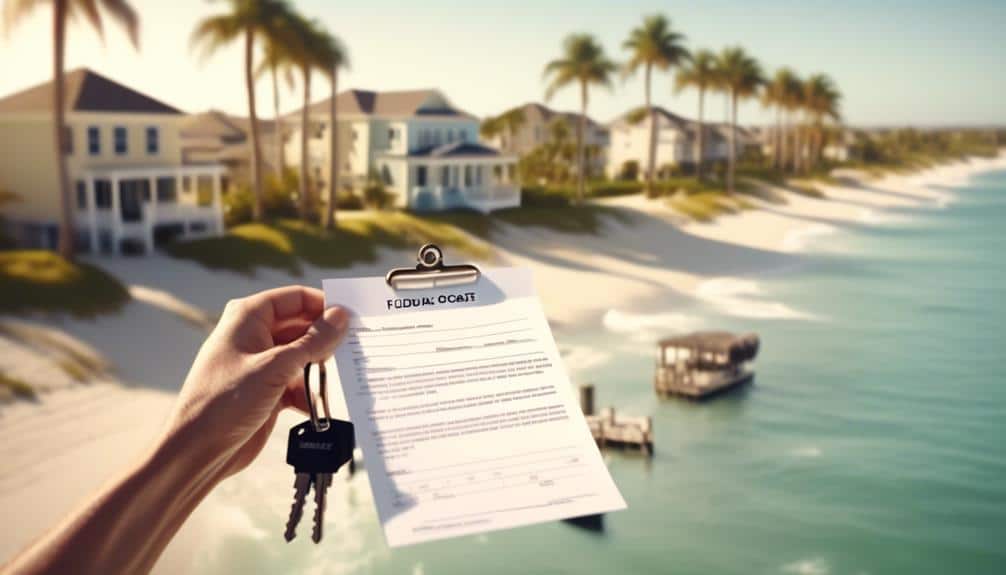Navigating the real estate market when buying a FL West Coast Home requires a blend of local knowledge, financial acumen, and strategic planning. As a homebuyer, the allure of sun-drenched beaches and thriving communities is tempered by the complexities of market trends, environmental considerations, and evolving regulations. To make an informed decision, one must heed expert advice tailored to this unique region.
Our discussion will explore quintessential tips instrumental to the purchasing process—from understanding local zoning laws and the implications of coastal weather patterns to the benefits of financial incentives available to prospective buyers. By examining these critical factors, we aim to equip you with the necessary insights to approach your potential investment with caution and clarity, ensuring you are well-prepared to make the most of the opportunities the Florida West Coast has to offer.
Key Takeaways
- Consider the impact of market trends and regulations on the Florida real estate market, such as economic expansion, interest rates, and housing demand.
- Prioritize location desirability by choosing a home with easy access to amenities, proximity to parks and beaches, and potential for resale value and community growth.
- Prepare for Florida’s weather impact by researching local building codes, investing in impact-resilient features, and securing adequate homeowners’ insurance.
- Explore financial incentives available for homebuyers, including assistance programs and incentives for first-time buyers, and assess how they align with your budget and cost of living.
Assess Market Trends
Understanding the dynamic market trends in Florida’s real estate landscape is crucial for homebuyers seeking to invest strategically in the West Coast’s burgeoning housing sector. Economic expansion, job creation, and population growth are pivotal indicators that drive the Florida real estate market. These factors, along with fluctuating interest rates, significantly influence median home prices, property tax implications, and the overall health of the housing market.
As real estate professionals keenly observe, the influx of new residents to Florida has accelerated housing demand, reshaping market trends. The COVID-19 pandemic has further nuanced these trends, sparking a heightened demand for spacious and second homes. Prospective homeowners must adapt to these shifts to align their purchasing strategies with current market realities.
To navigate these waters successfully, connecting with the Florida Housing Finance Corporation can provide valuable insights and assistance when buying a home. The housing market’s trajectory over the next decade suggests continued growth; thus, an informed approach to market trend analysis is non-negotiable. Embrace the expertise of seasoned professionals and become part of a community of discerning buyers who recognize the importance of informed decision-making in the vibrant arena of Florida Real Estate.
Understand Local Regulations
Navigating local building codes and regulations is crucial for Florida West Coast homebuyers to ensure their construction or renovation projects comply with all legal and safety requirements. When buying a house, especially if you’re considering building or renovating a home in Florida, understanding local regulations is not just advisable—it’s imperative.
A knowledgeable local real estate agent can be invaluable in this aspect. They help you navigate through the intricacies that areas offer, which can vary significantly from one municipality to another. To ensure you are well-prepared, consider these key points:
- Research Area-Specific Permits: Before initiating any construction, become familiar with the permitting process specific to the area in which you are interested.
- Environmental Factors: Consider hurricane-resistant construction measures, which are crucial in coastal regions.
- Builder’s Track Record: Partner with a builder with proven certifications and experience adhering to Florida’s stringent building standards.
Investing time in a thorough home inspection and understanding closing costs also play a crucial role in the homebuying process. By doing so, you align with a community of homeowners committed to safety, compliance, and the deep satisfaction that comes with owning a well-built and regulation-compliant home on Florida’s picturesque West Coast.
Prioritize Location Desirability
While adhering to local regulations lays the foundation for a legally sound purchase, elevating the importance of location desirability ensures your investment thrives in a community that meets your lifestyle needs and financial goals. When you buy a house in the Sunshine State, especially on the vibrant West Coast, you’re not just purchasing a property—you’re becoming part of a neighborhood that reflects your aspirations.
Engaging in a Home Search in Florida’s best places means finding properties that meet your current and future needs. Opting for a home in Florida with easy access to schools, shopping, and transportation can significantly enhance your quality of life. It’s also crucial to consider the outdoor lifestyle that Florida is famous for; being close to parks, beaches, and recreational facilities can fulfill those desires.
Consulting with a real estate expert can significantly assist you in buying a new home. They can provide insights into the local market, helping you to identify areas with the best potential for resale value and community growth. Here is a table that encapsulates the essence of location desirability:
| Amenities | Safety | Community Feel |
|---|---|---|
| Proximity to schools | Low crime rates | Welcoming neighbors |
| Shopping centers nearby | Reliable emergency services | Active local organizations |
| Convenient transportation | Well-lit streets | Community events |
| Parks and recreational areas | Hurricane Preparedness | Shared outdoor spaces |
| Cultural attractions | Insurance affordability | Sense of belonging |
Plan for Weather Impact
Recognizing Florida’s susceptibility to extreme weather, it is imperative for homebuyers on the West Coast to meticulously plan for the impacts of hurricanes, tropical storms, and persistent humidity. When envisioning your dream home, consider not just the sunlit patios and lush outdoor living spaces but also the resilience of your property to withstand Florida’s weather impact.
Here are three critical strategies to protect your investment:
- Research Local Building Codes: Ensure that your new house in Florida complies with the latest building codes, which are designed to withstand extreme weather conditions.
- Invest in Impact-Resilient Features: Select materials and enhancements for your home that can resist high winds and flying debris, such as impact-resistant windows and reinforced roofing.
- Secure Adequate Homeowners Insurance: Understand the nuances of homeowners insurance in Florida, including coverage for flood damage, which is often a separate policy.
Buying a home on Florida’s West Coast offers an idyllic lifestyle but demands a proactive approach to safety and security. By incorporating these precautions, you’ll safeguard your home and ensure that your slice of paradise remains a source of joy, regardless of the weather.
Evaluate Financial Incentives
As potential homeowners explore Florida’s West Coast’s vibrant real estate market, assessing the range of financial incentives available can be crucial, as these can significantly reduce the overall cost of purchasing a property. These incentives can be a game-changer, especially for first-time homebuyers, who may benefit from payment assistance programs to make homeownership more accessible.
Before committing to a mortgage loan, it is essential to evaluate how financial incentives align with your budget and the area’s cost of living. A solid credit score can unlock many assistance programs, offering you the flexibility to find a home that doesn’t just fit your lifestyle but also your financial goals.
In the table below, compare key incentives that can contribute to your homebuying journey, keeping in mind local job opportunities and overall Tips For Buying a home in this dynamic region.
| Incentive Type | Benefit | Consideration |
|---|---|---|
| Payment Assistance | Reduced upfront costs | Eligibility based on income |
| Tax Credits | Annual savings on tax returns | Must be a primary residence |
| Interest Rate Reductions | Lower monthly mortgage payments | Requires a good credit score |
| Closing Cost Assistance | Decrease in initial expenses | Often first-time buyers |
| Grant Programs | Non-repayable funds | Limited availability |
Seek professional advice to make the most of these financial incentives, ensuring that the home you choose enriches your sense of belonging and economic well-being.
Frequently Asked Questions
Will Home Prices Drop in 2024 in Florida?
Predicting a drop in Florida home prices for 2024 is speculative. Market dynamics, including economic conditions and demand trends, ultimately determine pricing, making it essential to monitor these factors closely.
Is It a Good Time to Buy a House in Florida in 2023?
Considering the robust economic growth and the influx of residents, 2023 presents a favorable moment for purchasing property in Florida, offering potential long-term gains amidst a thriving real estate landscape.
What Do I Need to Know Before Buying a FL West Coast Home?
Before purchasing a Florida home, it’s essential to understand local market trends, secure a loan preapproval, and work with a reputable real estate agent to navigate the process efficiently and successfully.
How Much Money Should I Save Before Buying a House in Florida?
Before purchasing a house in Florida, aim to save for a substantial down payment, typically 20%, plus additional funds for closing costs, moving expenses, and an emergency maintenance buffer.
Essential Points to RememberConclusion
Buying a house in Florida can be a complex process, especially for first-time buyers. The Florida real estate market is highly competitive, characterized by limited inventory and high demand.
Before starting the property hunt, potential buyers should understand the housing market, median home prices, and living costs in their preferred cities. They should also consider factors such as natural disasters, maintenance costs, and insurance premiums when browsing options.
Buyers should consult with real estate professionals, more lenders, and homebuying guidance agents to make the homebuying process more accessible. They should obtain preapproval, explore different loan options, and research private mortgage insurance. It is also essential to have a list of desired features, amenities, price range, and income details.
Once a buyer finds a suitable property, they should conduct a separate inspection and negotiate with the seller to reach a fair price. It is essential to work with an experienced real estate agent who can help with negotiations and guide you through the process.
Closing costs and an “s-Is” contract are hidden costs that should be considered. Buyers should also consider the effective property tax rate and annual property taxes when investing in real estate, including rental properties or investment properties.
Florida offers a luxurious lifestyle, complete with beautiful beaches and numerous investment opportunities. The median home price in Florida is higher than the national average, and the cost of living varies depending on location. Fort Myers, Siesta Key Beach, Disney World, and Captiva Island are popular destinations.
Borrowers with a credit score and debt-to-income ratio can obtain a mortgage with market rent. A diligent period is a crucial stage in the process. Buyers should remember to pay bills on time, keep a low percentage of income, and take a deep breath during the closing meeting.






